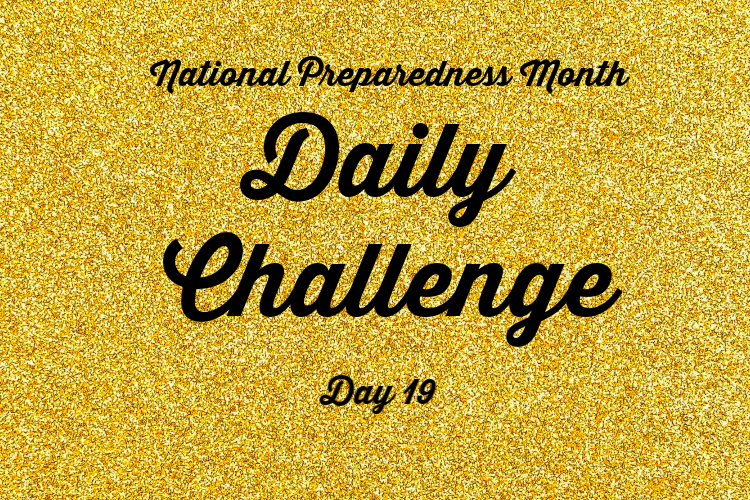If you're new here, you may want to subscribe to my RSS feed. Thanks for visiting!
Author of Be Ready for Anything and Bloom Where You’re Planted online course
If you missed the previous challenges, you can catch up here:
- Day 1
- Day 2
- Day 3
- Day 4
- Day 5
- Day 6
- Day 7
- Day 8
- Day 9
- Day 10
- Day 11
- Day 12
- Day 13
- Day 14
- Day 15
- Day 16
- Day 17
- Day 18
Today’s Challenge
These days, many of us rely too much on our phones’ memories instead of our own.
Back when I was a kid I had dozens of phone numbers memorized. Now, that number is about three.
Today’s task is very easy. Write down all important phone numbers and put them in your wallet.
What numbers should you write down?
- Family members’ homes
- Family members workplaces
- Family and friends’ cell phone numbers
- Your children’s schools and daycares
- Close friends
- Utility companies
- Neighbors
- Clergy
- Doctor’s office
My wallet is big enough to hold an index card, so that’s what I use for my numbers. It’s sturdier than a piece of paper. You might even consider laminating the list of phone numbers.
Did you get this done?
Maybe you’ve already done this. Are there phone numbers that I missed on the list above? Share them below.
Here’s where to check in on the forum.
















8 Responses
You may want to add phone numbers or passwords for banking and credit cards . Insurance company that holds your auto and home insurance. Also number for your medical insurance. These would be beneficial if your in a flood, earthquake, or fire prone area.
Good idea but if the grid was down, cell phones would not work to call people so even IF we had numbers we could not call them unless people had land lines that worked. If cell phones worked, then we would not need the lists. Still a good idea though.
It isn’t necessarily that the grid will be done. 🙂 Just that for some reason, your cell phone isn’t working. I should have been more clear.
Done, since the possibility of becoming homeless is always a threat it was a task I have done already.
I work in a prison as a correctional officer. My work place is not on my list to call if there is a civil disorder shtf. I would probably be one of those people are shooting at.????
I think you need a bit more information than just “a phone number”. Some of your vital contact people might have a home or cell phone down, but might have a work phone still functional. Sometimes a text message can get through even if a voice call can’t. Sometimes only an email works. Sometimes either snail mail or a personal visit to their physical address might be needed.
The point is that any of those possibilities could mess up with either your contacts — or with you. So not knowing what communication method(s) might be working on both ends, you need to have not only the relevant phone numbers plus texting information, but also their email addresses plus home and work addresses. You’re almost certainly going to run out of space on just a couple of 3×5“ cards. A micro memory card would certainly work as long as your electronics works, as might a flash drive — including duplicates. But you probably want to print out a hard copy — to be carried in a water-proof document bag. Search on Amazon to pull up a variety of such things.
–Lewis
This is going on my to do list for today… I’ve been meaning to do it for months and never got around to it. (Bad Kitty!)
I would also add insurance company, landlord or mortgage company, non-emergency fire, police numbers, municipal offices, transit information ( if applicable), local taxi service, local hospitals, veterinarian and pharmacy.
You also should have not only the number of your local bank branch, but the main number and your account number in case you need to evacuate and contact them to access your account.
Credit card numbers, ID number, soc sec number, insurance numbers, and Rx information, including numbers should also be written down and added to your BOB, in case you are stranded away from home and can’t get them. Needless to say, keep this list secure and DON’T LOSE IT!
Make a duplicate copy of at least the phone numbers for each family member. Put pet information in a zip lock bag and tape it to the inside top of their carrier or put it in a sealed sturdy luggage tag and attach to the handle. Be sure to include their medications, medical history and provider. Kids should also have copies of their medical info in their wallet or book bag.
I’ve also been neglecting it. Regarding banking, it’s my understanding that most banks do not keep more than about $10, 000 on hand and large withdrawals require at least 3 work days notice. Getting cash in a true SHTF is not going to be super likely.
I like that you mentioned pet info. That gets neglected a lot. I’ve never found a document or chart to plan for long term pet food.